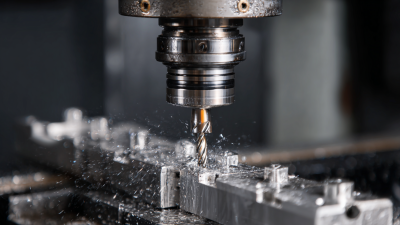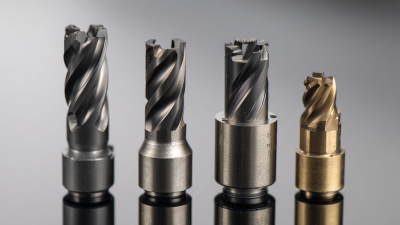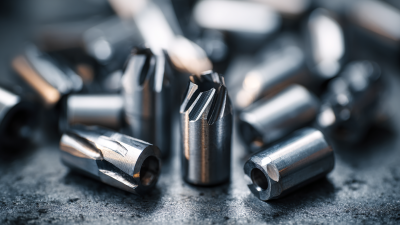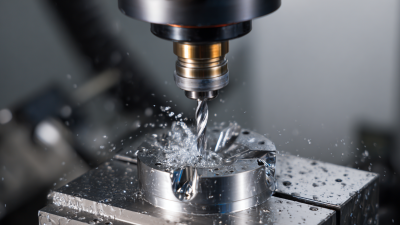How to Enhance Machining Efficiency with Boron Carbide Inserts in High Precision Applications
Table of Contents
- Benefits of Using Boron Carbide Inserts in Precision Machining
- Key Considerations for Selecting the Right Boron Carbide Inserts
- Optimizing Cutting Parameters for Enhanced Performance
- Maintenance Tips for Longevity of Boron Carbide Inserts
- Comparative Analysis: Boron Carbide vs. Traditional Inserts
- Case Studies: Success Stories in High Precision Machining
- Exploring the Cost-Effectiveness of ZCCCT CNC Tungsten Inserts: Insights from Industry Reports and Market Trends
- FAQS
- Conclusion
- Related Posts
Looking to boost machining efficiency, especially for high-precision work? Well, Boron Carbide Inserts have really become a game-changer in the CNC cutting tool world. It's pretty wild—industry reports suggest the global market for CNC tools could hit around $16 billion by 2026. That's mainly thanks to new manufacturing tech and a growing need for super accurate parts. At the forefront of all this is Jinan Terry CNC Tool Limited Company. They're well-known as a top exporter of CNC cutting tools in China, and they’re really leading the charge with high-quality Boron Carbide Inserts. These little guys pack a punch—they’re incredibly hard and resistant to wear, which makes them perfect for machining tough materials. That means manufacturers can hit tighter tolerances and cut down on cycle times. When companies start using Boron Carbide Inserts, not only do they see a bump in efficiency, but they also save money and improve overall quality—pretty awesome, right?

Benefits of Using Boron Carbide Inserts in Precision Machining
Boron carbide inserts are really changing the game in precision machining. They offer some pretty unique benefits that tackle the tough problems that come with machining hard materials. These inserts are super hard and resist wear like crazy, which makes them perfect for detailed work—think finishing off bearing journals, gears, and brake drums. Industry insiders say that using boron carbide inserts can really cut down on tool wear, sometimes extending their life by three to five times compared to the regular carbide tools we’re used to. Pretty impressive, right?
But it's not just about making your tools last longer. Boron carbide also conducts heat really well, helping to keep things cool and avoiding those thermal distortions that can mess up the precision of your parts. Some recent studies show that switching to these inserts can actually speed up your machining—by roughly 20%—which is a big deal when you're working with tight tolerances.
Plus, because they’re so resistant to wear, you don’t need to swap them out as often. That means smoother operations, higher productivity, and ultimately, lower costs in the long run. It’s like having a tool that works smarter and longer for you—that’s pretty cool, don’t you think?
Key Considerations for Selecting the Right Boron Carbide Inserts
When you're choosing the right boron carbide inserts for high-precision machining, there are a few important things to keep in mind. First off, material compatibility is a big deal — this stuff works best when used on really hard materials that can take advantage of its awesome wear resistance and hardness. So, knowing what kind of material you're working with and its properties will definitely help you pick the right inserts that won't give out under tough conditions.
Another thing to think about is the shape of the insert and how the cutting edge is designed. Different shapes can affect things like chip formation, the finish of the surface, and how long the tool lasts. For jobs requiring high accuracy, going for inserts with sharp edges and the right cutting angles can really make a difference, making your work more efficient and precise.
Oh, and don’t forget about coatings — they can add some extra perks like better lubrication and heat resistance, which means the whole process runs more smoothly and lasts longer. If you take these points into account, you'll be in a good spot to get the most out of your boron carbide inserts and achieve better results in those high-precision tasks.
Optimizing Cutting Parameters for Enhanced Performance
Getting those cutting parameters just right is super important if you want your boron carbide inserts to perform at their best in high-precision machining. It’s pretty well-known that tweaking things like cutting speed, feed rate, and how deep you cut can really boost efficiency. For example, I came across a study in the International Journal of Advanced Manufacturing Technology that mentioned bumping up the cutting speed from 100 m/min to 150 m/min with boron carbide inserts can give you about a 30% jump in material removal rate — all while still keeping the same level of accuracy and a nice surface finish. Pretty impressive, right?
And, here’s something else interesting — the link between feed rate and how long your tools last is a big deal. According to a recent analysis by the Society of Manufacturing Engineers, if you increase the feed rate from 0.1 mm/rev to 0.15 mm/rev on traditional materials, you could see about a 20% drop in tool life. But here’s the kicker — boron carbide inserts are tougher than that. They’ve shown to actually hold up and last about 50% longer under similar conditions. That really shows how versatile and resilient boron carbide can be, especially in tricky, high-precision settings.
It’s clear that not only can these inserts handle higher workloads, but they can also help make your machining process more efficient and productive overall.
Maintenance Tips for Longevity of Boron Carbide Inserts
 Boron carbide inserts have really become a game-changer when it comes to
high-precision machining. Their incredible hardness and heat resistance
make them perfect for cutting tough materials without sacrificing accuracy. That said, if you want
these inserts to last and perform at their best, regular maintenance is pretty much a must. One easy
but super important tip is to keep an eye on how the wear pattern looks.
According to a study from the Manufacturing Technology Institute, just paying attention
to this can actually boost the tool’s lifespan by up to 30%.
Catching wear early means you can swap out the insert before it causes any big problems. Also, don’t
forget about coolant. Proper coolant application during the machining process is a total
game-changer. The American Society of Mechanical Engineers highlights that using enough
coolant doesn’t just slow down wear, but also boosts cutting performance — meaning faster, better machining.
And while you’re at it, make sure to check and clean the inserts regularly. This helps stop debris from building up, which can cause overheating and early breakdown.
Using ultrasonic cleaning methods has shown to be especially effective, keeping the inserts
in good shape longer. Stick with these simple maintenance tips,
and you’ll get the most out of your boron carbide inserts while making your machining work smoother
and more efficient.
Boron carbide inserts have really become a game-changer when it comes to
high-precision machining. Their incredible hardness and heat resistance
make them perfect for cutting tough materials without sacrificing accuracy. That said, if you want
these inserts to last and perform at their best, regular maintenance is pretty much a must. One easy
but super important tip is to keep an eye on how the wear pattern looks.
According to a study from the Manufacturing Technology Institute, just paying attention
to this can actually boost the tool’s lifespan by up to 30%.
Catching wear early means you can swap out the insert before it causes any big problems. Also, don’t
forget about coolant. Proper coolant application during the machining process is a total
game-changer. The American Society of Mechanical Engineers highlights that using enough
coolant doesn’t just slow down wear, but also boosts cutting performance — meaning faster, better machining.
And while you’re at it, make sure to check and clean the inserts regularly. This helps stop debris from building up, which can cause overheating and early breakdown.
Using ultrasonic cleaning methods has shown to be especially effective, keeping the inserts
in good shape longer. Stick with these simple maintenance tips,
and you’ll get the most out of your boron carbide inserts while making your machining work smoother
and more efficient.
Comparative Analysis: Boron Carbide vs. Traditional Inserts
You know, boron carbide inserts are really changing the game when it comes to high-precision machining. They’re a pretty awesome alternative to the usual tips made from carbide or high-speed steel. What’s cool is that boron carbide is super hard and resistant to wear, which means the tools last longer and don’t wear out as quickly. That’s a big plus because it helps manufacturers hit tighter tolerances and get nicer surface finishes. Plus, they’re lighter, which helps cut down on vibrations during machining, making the whole process smoother and more stable.
When you start comparing boron carbide inserts with traditional ones, a few things stand out—things like cutting speeds, how long the tools last, and how well they handle heat. Boron carbide can handle higher speeds without breaking a sweat, making it perfect for high-volume runs. And because it’s thermally stable, the risk of the tool overheating or failing is much lower. Traditional inserts, on the other hand, often struggle under these conditions, meaning more frequent tool changes and extra downtime. So, if you’re all about boosting efficiency and getting precise results, boron carbide inserts definitely have the edge over the old-school options.
How to Enhance Machining Efficiency with Boron Carbide Inserts in High Precision Applications - Comparative Analysis: Boron Carbide vs. Traditional Inserts
| Insert Type | Material Removal Rate (mm³/min) | Tool Life (minutes) | Surface Finish (Ra, µm) | Cost per Insert ($) |
|---|---|---|---|---|
| Boron Carbide | 440 | 120 | 0.8 | 35 |
| Traditional Inserts | 300 | 80 | 1.5 | 20 |
Case Studies: Success Stories in High Precision Machining
When it comes to high-precision machining, boron carbide inserts have really been a game-changer. They've helped manufacturers boost efficiency in a big way. For example, there are several case studies showing just how effective they are — companies have seen their tool life last way longer and the surface finishes get notably better. One well-known aerospace parts manufacturer, for instance, found that switching to boron carbide inserts bumped up their tool lifespan by around 75%. That meant less downtime and some pretty impressive savings — almost 30% in overall costs, according to a recent report from Technavio.

There’s also a cool story from an auto parts supplier who started using boron carbide inserts in their milling processes. Not only did they get more accurate shapes and details, but they also sped up their production by about 40%. An industry study from Research and Markets pointed out that adopting materials like boron carbide can cut machining cycles in half — making it easier for companies to keep up with the high standards of precision manufacturing. All in all, these success stories really highlight how boron carbide inserts are transforming the game, driving better efficiency and quality in high-precision work.
Exploring the Cost-Effectiveness of ZCCCT CNC Tungsten Inserts: Insights from Industry Reports and Market Trends
The cost-effectiveness of ZCCCT CNC tungsten inserts is becoming increasingly evident as industries seek reliable solutions for their machining needs. ZCCCT's carbide inserts, particularly the CCMT09T304-EM YBG205 model, are specially designed for precision semi-finishing processing of steel and stainless steel workpieces. The use of advanced coating options like PVD and CVD ensures durability and enhances cutting performance, making these inserts an excellent investment for manufacturers aiming to optimize production efficiency.
Incorporating ZCCCT tungsten inserts into CNC cutting and lathe machines can significantly improve operational performance. With a minimum order quantity of just 10 pieces, businesses can easily integrate these high-quality inserts without a heavy initial investment. The versatility of these tools, compatible with various tool holders such as SCACR/L, SCLCR/L, and SCFCR series, allows for wide-ranging applications. The promise of 100% original CNC cutting tools adds value, ensuring that companies receive authentic products that meet rigorous industry standards, further enhancing the overall cost-effectiveness of adopting ZCCCT cutting solutions.
FAQS
: Boron carbide inserts provide exceptional hardness and wear resistance, extending tool life by 3 to 5 times compared to traditional carbide tools, while also enhancing machining efficiency and reducing cycle times by approximately 20%.
They significantly reduce tool wear, leading to a longer tool life and less frequent tool changes, which increases overall production throughput and reduces operational costs.
They are ideal for high-precision applications such as finishing bearing journals, gears, and brake drums.
Boron carbide inserts offer superior hardness, abrasion resistance, and thermal stability, allowing for longer tool life and better performance at higher speeds than traditional inserts made from carbide or high-speed steel.
The use of boron carbide inserts can enhance machining efficiency by reducing cycle times and minimizing thermal distortion in precision parts, thereby enabling operations to achieve tighter tolerances.
Yes, their high abrasion resistance decreases the need for frequent tool changes, which minimizes downtime and increases overall manufacturing efficiency.
Boron carbide’s superior thermal conductivity helps dissipate heat efficiently, reducing thermal distortion and the risk of tool failure due to heat buildup.
Yes, they can operate effectively at higher speeds in high-volume production settings without compromising integrity, making them a favorable option for manufacturers looking to boost efficiency.
The lightweight design of boron carbide inserts contributes to decreased tool vibration, enhancing stability during machining processes.
By reducing tool wear and minimizing the frequency of tool changes, boron carbide inserts lead to lower operational costs associated with tool replacement and downtime.
Conclusion
Boron Carbide Inserts are really changing the game in precision machining. They bring a bunch of great benefits, like being super hard and resistant to wear, which makes them perfect for those high-performance tasks. But, of course, picking the right inserts is a big deal—that means thinking about what material you're working with and the cutting conditions, so you get the best possible results. If you tweak the cutting settings just right, you can really boost both efficiency and productivity, and don’t forget—taking good care of your inserts with proper maintenance helps them last longer.
When you compare Boron Carbide Inserts to traditional ones, they usually come out on top — lasting longer, cutting faster, and showing just how much more durable they are. There are plenty of case studies out there that show how they can totally transform high-precision machining processes, leading to some pretty impressive results. As a top exporter of CNC cutting tools, Jinan Terry CNC Tool Limited Company offers top-quality Boron Carbide Inserts, helping manufacturers hit their machining goals with ease.
Related Posts
-

How to Maximize Efficiency with Boron Carbide Inserts in Your Operations
-

How to Select the Best Cnc Indexable Carbide Inserts Wnmg for Your Machining Needs
-

How to Optimize Your Production Efficiency with Cnc Machine Inserts and Achieve 20 Percent Cost Savings
-

Ultimate Guide to Choosing the Right Carbide Cutting Inserts for Your Projects
-

How to Choose the Best Carbide Insert for Aluminum Machining
-

7 Best Tips to Maximize the Efficiency of Carbide Tool Inserts
Blog Tags:

Amelia
-

Phone
-

E-mail
-

Skype

